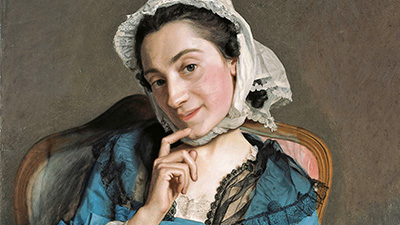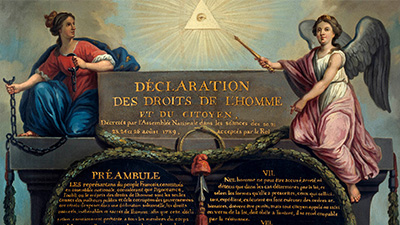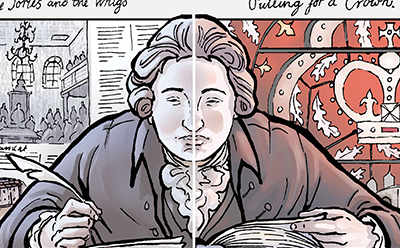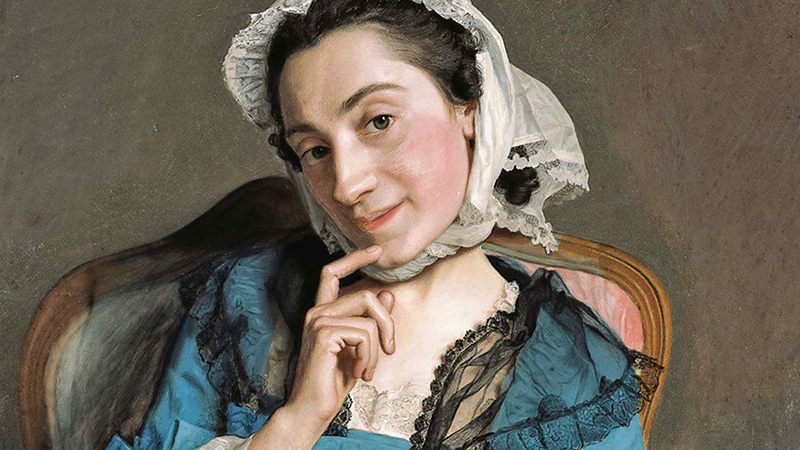The Enlightenment
Driving Question: How did Enlightenment ideas help spark revolution?
The Enlightenment, which began in the late seventeenth-century, was a European movement emphasizing reason, science, individualism, and skepticism of traditional authority. Thinkers applied rational principles to government, philosophy, science, and religion, inspiring revolutions based on equality, reason, and freedom. Material conditions, such as rising taxes or food prices, also fueled public unrest.
Learning Objectives:
- Evaluate the influence of Enlightenment ideas on political revolutions.
- Learn how new ideas about sovereignty and individualism affected states.
- Practice sourcing to evaluate the Enlightenment’s impact on revolutionary thought.
Vocab Terms:
- capitalism
- citizen
- democracy
- liberal
- rational
- revolution
- sovereignty
- the Enlightenment
Opener: The Enlightenment
To teach this lesson step, refer to page 2 of the Lesson 4.2 Teaching Guide.
Want additional ways to approach learning new words? Look no further than the OER Project Vocabulary Guide.
Revolution and evolution are two words that may look similar, but the distinctions between them can help us evaluate the Age of Revolutions.
Revolutionary Ideas
To teach this lesson step, refer to page 3 of the Lesson 4.2 Teaching Guide.
Find before-, during-, and after-reading strategies and more ways to support all learners in our Differentiation Guide.
Enlightenment ideas surrounding rights and sovereignty aimed high, but as you’ll explore in these articles and activity, they had their limits.
-
Guiding Questions
-
Before you read
Preview the questions below, and then skim the article. Be sure to look at the section headings and any images.
While you read
Look for answers to these questions:
- Why was the idea that the Universe had rules we could understand by examining the world around us considered revolutionary?
- What Enlightenment idea was most revolutionary in its influence on the political world?
- What views did Enlightenment thinkers have about slavery and the rights of women?
- Some people pushed for a more revolutionary result from the Enlightenment. Who were they?
After you read
Respond to these questions: Do you think the Enlightenment should be called revolutionary? Why or why not?
-
Guiding Questions
-
Before you read
Preview the questions below, and then skim the article. Be sure to look at the section headings and any images.
While you read
Look for answers to these questions:
- What is a citizen, and how is the idea of popular sovereignty important to creating citizens?
- Thomas Hobbes was an important thinker from this period who wrote Leviathan, a book about popular sovereignty. How does the image from Leviathan express that idea?
- What groups of people were left out of ideas about sovereignty?
- How did ideas about sovereignty lead to some people losing rights?
After you read
Respond to these questions: What is the author of this article’s main claim about sovereignty? Do you agree?
Words of the Enlightenment
To teach this lesson step, refer to page 5 of the Lesson 4.2 Teaching Guide.
Check out this thread Enlightenment Quotes Activity Extension Possibility, for ideas to extend this activity.
The ideas of the Enlightenments are often best analyzed through the words of those who shaped it. Compare original quotes and their modern “translations.”
Closer: The Enlightenment
To teach this lesson step, refer to page 6 of the Lesson 4.2 Teaching Guide.
Want to learn more about Enlightenment thinkers like Burke. Read the blog post, “Give me cereal, or you get death!”
The Enlightenment was full of contradictions. This activity uses the biography of one man to illustrate just how complicated these new ideas could get.
Dare to Know
To teach this lesson step, refer to page 6 of the Lesson 4.2 Teaching Guide.
Enlightenment thinkers sought to transform their world and how people thought about it. Use the article, source collection, and activity to examine their motives and impacts.
-
Guiding Questions
-
Before you read
Preview the questions below, and then skim the article. Be sure to look at the section headings and any images.
While you read
Look for answers to these questions:
- What evidence do we have that scientific observation and experimentation occurred before the sixteenth-century Scientific Revolution?
- How did new technologies contribute to the expansion of scientific knowledge?
- How did Islamic scholars contribute to the discoveries of the Scientific Revolution?
- In what ways did women contribute to the Scientific Revolution and how did women’s involvement in this revolution change over time?
- How might the Scientific Revolution have led to the Industrial Revolution?
After you read
Respond to the following questions: What is one example of how scientific inquiry has changed since the Scientific Revolution and what is one example of how scientific inquiry has stayed the same?









